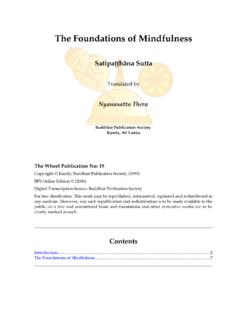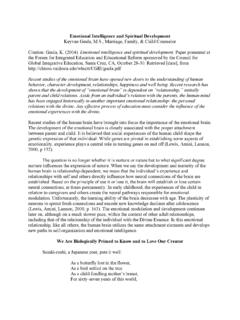Transcription of The Bahamas
1 1 | VAT ADOPTION IN THE BAHAMASThe Bahamas The Economic Consequences of the Value-Added Tax for the BahamasAugust 2013 Prepared by:David Godsell, , , MBA, MSc, CMA1 | VAT ADOPTION IN THE BAHAMAS2 | VAT ADOPTION IN THE BAHAMASThe Economic Consequences of the Value-Added Tax for The BahamasExecutive SummaryAs described by the White Paper released by the Bahamian government in February 2013, the Bahamas is poised to adopt value-added taxes (VAT) in July 2014. In this report we discuss the economic consequences of VAT adoption and elaborate on the welfare loss that can be anticipated for consumers, labourers, employers and the government. Consumers can expect a one-time increase in price levels and a loss of purchasing power. Labourers can expect a decline in real wages which will in turn lead to a decline in the labour supply. Businesses and employers with VAT-based sales can expect reduced demand for goods and services, which will in turn reduce their demand for labour.
2 Under extraordinarily conservative estimates biasing towards heightened government revenues, we forecast VAT adoption will lead to a $165 million decline in government revenues. Simultaneously, we estimate VAT adoption will burden the private sector with $103 million in annually recurring compliance costs and an average of $4,300 in compliance start-up costs for each VAT registrant. The report concludes by pointing to failed VAT adoptions in countries similar to the Bahamas and by highlighting contemporary efforts to reduce budget deficits through reductions in government spending. The Nassau Institute Box N 1688 Tel: (242) 326-5728 Fax: (242) 323-7272 E-mail: | VAT ADOPTION IN THE BAHAMAST able of ContentsPage 4 - Introduction Government Position Organization of this Report The Bahamas ContextPage 7 - VAT Stakeholders and Welfare Consumers Homeowners Informal Economy Participants Government and Taxpayers Labour Accounting Trade Groups Employers / Businesses Exporters Financial Services Economic Freedom IndexPage 15 - Government Revenues and Private Sector Compliance Costs Government Net Revenues Administration Costs Tax Revenues Replaced by VAT Private Sector Compliance CostsPage 29 - VAT Adoption Elsewhere Malta Grenada JapanPage 30 - Alternative.
3 Spending CutsPage 31 - ConclusionPage 32 - References ConsultedPage 42 - Author Biography4 | VAT ADOPTION IN THE Introduction The purpose of this paper is to list and describe the anticipated economic effects of value-added-tax (VAT) adoption in the Bahamas . First, we consider the effect of VAT adop-tion on consumption, government size and scope, employment and business activity. Additional effects are cap-tured by describing how the Bahamas Economic Freedom Index Ranking will likely change. Second, we provide our analysis of incremental govern-ment revenues from VAT, and under a series of extraordinarily conservative assumptions we demonstrate that VAT adoption will lower, rather than in-crease, government revenues by $165 million. Third, we provide further analysis which estimates annually re-curring private sector VAT compliance costs of $103 million and one-time start up costs of $4,300 per VAT regis-trant. Fourth, we present two caution-ary tales of failed VAT implementation in two small island economies; and of the devastating and long-lived impact of a VAT rate increase in Japan.
4 Fifth, we present contemporary evidence of OECD countries which, with low or no VAT, have chosen to curb government spending to bridge budget deficit gaps rather than increase or introduce VAT. A summary Government Position The White Paper on Tax Reform to Secure Adequate Revenues for the Future comes on the heels of a government funding crisis and the adoption of VAT in a small number of neighbouring Caribbean countries. Starting in France in 1954, VAT, or value-added taxes, have been adopted in 140 countries worldwide. Factors motivating VAT adoption include the presence of government funding crises and a copycat effect. Keen and Lockwood (2007) find strong evi-dence of a copycat effect wherein VAT adoption spreads in regional bursts. On February 2013 the Baha-mas Ministry of Finance released the White Paper. The report proposes the adoption of a VAT. In the report the Ministry contrasts the VAT with other tax vehicles ( , a sales tax, income tax); outlines what taxes may be replaced by the VAT and describes the anticipated economic impact of the VAT.
5 In a subsequent presentation in April 2013, the Ministry of Finance suggests the goal of VAT is to increase government revenues from VAT by approximately $100-160 million or 2% of gross domestic product (GDP). In a June 15, 2013 speech by the Rt. Hon. Owen S. Arthur, it is noted that the VAT is intended to aid the gov-ernment in meeting, an evolving pat-tern of expenditure associated with its assumptions of all the obligations of nationhood. This report details effects of VAT adoption on consumers, labour, business and government. Private sector compliance costs are estimated at $103 million. Enclosed estimates show government revenues declining by $165 will face a one-time price-level will experience a decline in purchasing power and real wages. 5 | VAT ADOPTION IN THE Organization of this Report In the second section of this paper, we present arguments sug-gesting VAT adoption would lead directly to welfare losses for virtually all Bahamians. Drawing from a large theoretical and empirical literature, as well as reports of VAT adoption in other countries, we provide strong evidence that VAT adoption is welfare destructive.
6 First, we demonstrate the devastating impact of VAT adoption on consumers who suffer higher price levels, while encouraging consumer engagement in the informal economy. Second, we provide evidence on the tendency for governments to grow in size and scope after VAT adoption; and on government impotency to eliminate deficits after VAT adoption. Third, we describe how VAT adoption lowers the real wages of Bahamians while simul-taneously shifting public and private resources to accounting trade groups and the accounting profession. Fourth, we discuss the direct impact on Baha-mian businesses, with consideration given to reduced international com-petitiveness of Bahamian exporters, as well as to the relatively benign effect on the financial services sector. Fifth, we further describe how VAT adoption will impede economic transactions by adopting the lens of the Economic Freedom Index Rankings. In the third section of this paper, we compile information on the government revenues and ex-penses which could be expected from adopting VAT.
7 This section relies on other-country data, which is generally available for OECD countries, but scarcer for peer-Caribbean and other highly-developed but developing countries. Using available other-coun-try data, we estimate gross VAT revenues, VAT rebates and refunds, VAT administration costs and the tax-es VAT may replace. In addition, we account for VAT leakage from non-compliance, the eight various forms of VAT fraud and uncollectible VAT owing. Under conservative assump-tions with substantial bias toward heightened government revenues, the arithmetic produced by these estimates provide for an expected net loss to the government following VAT adoption of $165 million. In a subse-quent section, we show that not only are government coffers diminished, but VAT adoption burdens the pri-vate sector with compliance costs of approximately $103 million. In the fourth section, we draw cautionary tales from two countries comparable to the Bahamas which adopted VAT. Malta and Grenada are juxtaposed with the Bahamas and the non-trivial probability of implemen-tation failure is addressed; thereafter the crippling economic effect of VAT rate increases in Japan is discussed.
8 In the fifth section we describe how the proliferation of VAT is not universal and that more recently major coun-tries are choosing not to increase or introduce VAT to bridge budget defi-cit; but rather are choosing alternative policies which including reducing government spending. A summary concludes. VAT adoption is welfare destructive. Governments grow in size and scope after VAT adoption. 6 | VAT ADOPTION IN THE The Bahamas Context The Bahamas has many unique characteristics. It is a highly-developed developing nation which boasts the highest per-capita income in the Ca-ribbean. It is well known for tourism1 and financial services and these service sectors make up the majority of Ba-hamian GDP and earn the majority of Bahamian foreign exchange. Like many countries, the Bahamas was adversely affected by the recent recession and GDP shrank at an average annual pace of from 2007-2011. More re-cently, GDP growth was in 2012, though the Bahamas is, still muddling its way through the post-recession landscape.
9 2 This is evidenced by a 7% year-over-year revenue slump in hotel revenue as of April 20133 and tourist arrivals which have been declining since 2006. Furthermore, govern-ment expenditures in 2012 exceeded revenues by $300 million, creating a funding gap which has contributed to a growing public debt of $ billion. The Bahamas is also character-ized by a considerable informal sector (by definition, unmeasured), an ele-vated unemployment rate, moderate income inequality (though, the highest 1 Tourism together with tourism-driv-en construction and manufacturing accounts for approximately 60% of GDP and directly or indirectly employs half of the archipelago s labour force (CIA Factbook, 2013).2 Source: Source: the Caribbean)4, an unhurried legal system5 6, and government-protected i n du st r 8 Furthermore, Bahami-ans may not own foreign currency Finally, the Caribbean is a data-poor region, a characteris-tic which obstructs inferences from empirical observations regarding other-country VAT adoption.
10 4 Source: Despite its roots in the British judicial system, two centuries of Bahamian history, the many outstanding lawyers and a pervasive and prosperous Christianity, the Rule of Law does not carry the day in the Bahamas . Attorney General Alfred Sears is reported as echoing the conclusion of the crime commission with comments on thepervasive culture of dishonesty that exists in the Bahamas . (Report on Trade Liberaliza-tion, p. 17; ). 6 Source: Doing Business in the Bahamas : 2011 Country Commercial Guide for US Companies ; Despite recent efforts to reduce backlog of criminal and civil cases, resolution of court cases can be slow, some-times taking years. The Embassy has received some reports of encounters with biased judges and malfeasance by attorneys. The Embassy has also received reports of local defendants evading payment of Bahamian civil judgements or deliberately dragging out court disputes, especially in cases involving non-resident plaintiffs.







